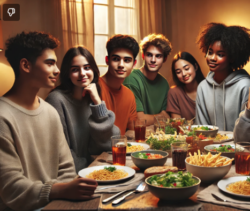This year, colleges are asking a question on applications that I’ve only rarely encountered before in my work as a College Admissions Coach:
- “Describe a time when you strongly disagreed with someone about an idea or an issue.” (Harvard)
- Describe a time when you engaged others in meaningful dialogue around an issue that was important to you. Did this exchange create change, new perspectives, or deeper relationships?” (George Washington U)
- “Please cite a specific conversation you had where a conversation partner challenged your perspective or you challenged theirs.” (Boston College)
If colleges are asking applicants whether they know how to engage with those they disagree with, it means they are sounding the alarm; the ability to have challenging conversations with diverse viewpoints is a critical skill for success in university and beyond.
When prompted, a few of my students came up with wonderful responses. One talked about how her rabbi facilitated a contentious conversation about Gaza. Another articulated his appreciation for the diversity of his cafeteria table and how he learns from the many, opposing opinions. Still another described an informal group she has formed with her English teacher and friends to talk about books and social issues over lunch.
The problem is that most of my students were at a total loss about how to respond. They could not come up with a time when they disagreed with someone about anything important. The majority of my students confessed that other than a few class discussions, they have never “engaged others in meaningful dialogue.” With dinner table conversations down to 7 minutes because of sports practices, play rehearsals, work and other commitments, families have no time to talk about anything except logistics. And even though they are shouted at all day long by social media, teenagers just haven’t had much practice engaging with opposing viewpoints. Honestly, neither have we.
Having challenging conversations is a muscle most of us adults have not activated lately. There is a feeling that the stakes are too high, so it’s safer not to engage. There is also the problem that we are talking past one another. With the deluge of misinformation or siloed information out there, we are literally not talking about the same thing anymore. We are too polite, too scared, too misinformed, and too disconnected from people who hold different viewpoints from us to disagree with others. So how can we expect our children to have meaningful, constructive dialogues?
Is it fair to even ask these kids about challenging conversations on their college applications? I think so. Discussions foster deeper understanding, promote critical thinking, and active listening, particularly to opposing perspectives. Colleges want to create welcoming campuses where students from every background feel comfortable expressing their opinions. Colleges also want to know, Will this student be able to disagree with someone in class, then brush their teeth in the dorm next to that same person at night? Universities understand that it’s essential for incoming students to have skills to disagree about complex topics on campus, and in life.
Before becoming a college admissions and essay coach, I was an English teacher for a couple of decades. I was lucky enough to be able to teach free from the pressures of AP tests, so I could focus on the art of conversation with my students. Every single class was a student-led discussion about a common text that we read the night before. At first the students were terrible at discussions; the same two extroverts spoke for the whole period. Then, with feedback and facilitation, all the students learned to invite others into the conversation, ask clarifying questions, listen without judgment, and even change their minds on the toughest issues based on something one of their classmates said. What does this have to do with English? To become good readers and writers, students must practice being good thinkers. I believe that constructive dialogue is a lost art. It’s also the best way I know to understand others and ourselves better, not to mention create meaningful connections. So I’m bringing it back!
For my 10th and 11th grade students who work with me on their college applications, I’m going to be offering a “Breaking Bread” series, inspired by a similar series our local public radio station held on air. This will be an opportunity to share a meal (food is the ultimate connector) and discuss an article about a complex issue. The students come from different backgrounds and represent many different perspectives. That’s the good part. The tricky part is that we will be in different time zones so the meal part will be virtual, but they will have full permission to eat and drink while we discuss a new, short piece each month. I want to facilitate these challenging conversations as acts of hope. Maybe we can do a series for adults, too. I believe that if we learn to have courageous conversations across differences, we might do more than get into college. We might navigate our way to a future of diverse perspectives living peacefully together.
Love,
Susie
***
There’s still time to sign up to be one of my students! Request a 30 min free consult HERE.

